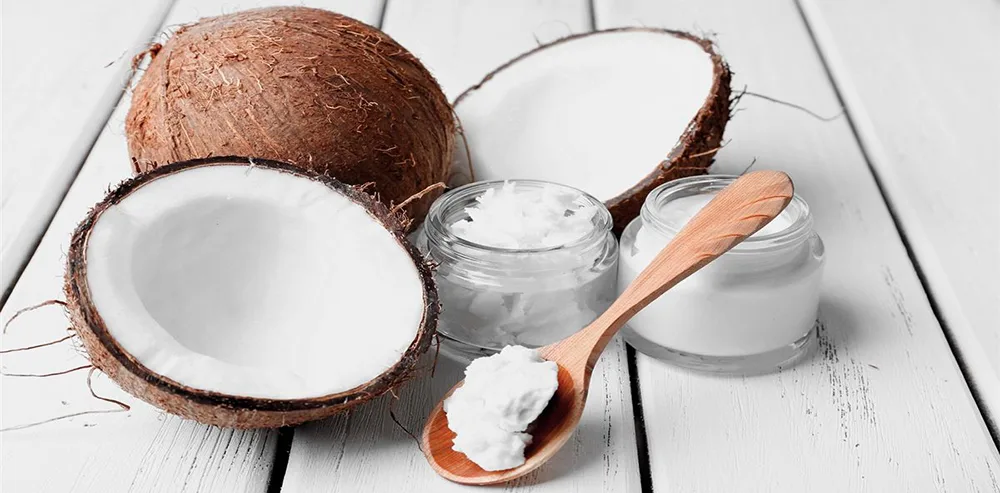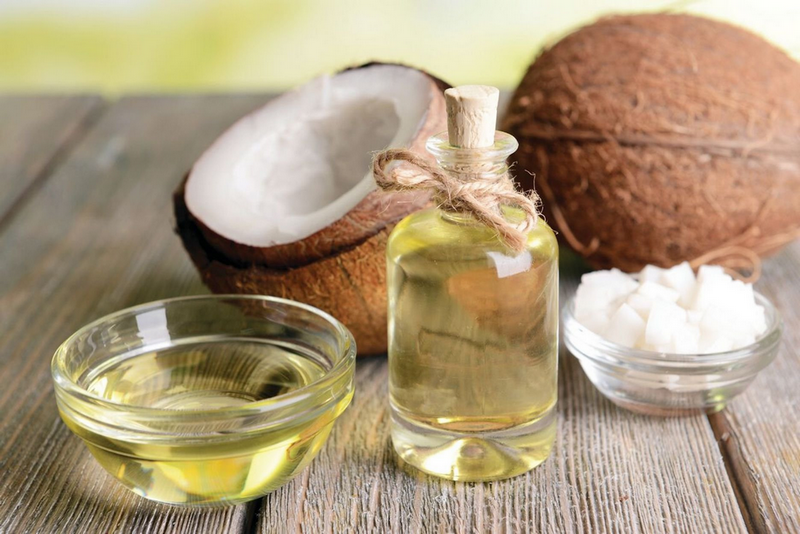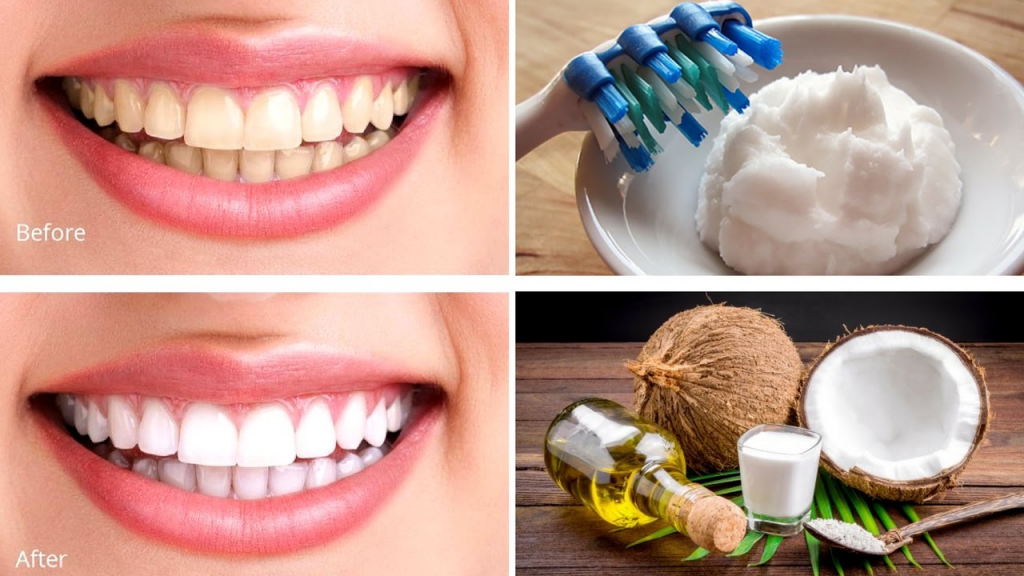Teeth whitening has become a highly sought-after cosmetic procedure, and with the myriad of products available, it’s essential to consider not only effectiveness but also safety. Among the natural products surfacing as potential teeth whiteners is coconut oil. In this article, we unveil how this natural oil could help brighten your smile without harsh chemicals. Coconut oil is not only a staple in the kitchen but could also be an effective method in your oral care routine for getting whiter teeth without damaging your tooth enamel.
Introduction to Coconut Oil as a Natural Teeth Whitening Solution
Coconut oil has gained prominence for its health benefits, including its use in improving oral health. It’s an effective natural remedy, delivering good results when used consistently. Being a natural product, it contains lauric acid, which helps remove bacteria causing plaque and yellowing teeth. Moreover, as a bonus, it promotes gum health. The technique of oil pulling, which involves swishing a tablespoon of coconut oil in your mouth, has been used traditionally for oral hygiene and could help in the quest for the whitest teeth.

Understanding the Benefits of Coconut Oil for Oral Health
Aside from whitening effects, coconut oil has several perks that contribute to oral health. Its antimicrobial properties make it capable of fighting harmful bacteria in the mouth, which might contain agents responsible for tooth decay and bad breath. Furthermore, virgin coconut oil helps maintain healthy gums and could prevent gum diseases. For those who want more than just whiter teeth, coconut oil is a natural product that also helps improve overall dental health.
Debunking Myths: How Effective Is Coconut Oil for Teeth Whitening?
While coconut oil could cause a modest improvement in tooth whiteness, it’s essential to manage expectations. It’s not a bleaching agent like many commercial whitening products, but it helps promote cleaner teeth by removing surface stains. Remembering that effective results come from consistent and holistic approaches to dental care, oil pulling might not instantly deliver a dramatic change, but it is impactful over time in maintaining a healthier, brighter smile.
How To Use Coconut Oil for Whiter Teeth
Oil pulling is a simple procedure that involves swishing oil in your mouth. Start with a tablespoon of virgin coconut oil, as it has been shown to contain the essential oils and lauric acid needed for good results. Swish gently around the mouth so it could also reach the gums, promoting oral health, and pull between teeth for optimum coverage. The practice should last for about 15-20 minutes, followed by spitting the oil into a trash can to prevent drain clogging.
- Place a tablespoon of virgin coconut oil into your mouth.
- Swish the oil around, pulling through teeth, for 15-20 minutes.
Tips and Tricks for Enhancing the Whitening Effect
For those looking for more effective ways to enhance coconut oil’s teeth whitening capability, you might want to consider adding other natural whitening agents. Baking soda, for instance, has a mild abrasive effect that helps remove yellow stains, while oils like peppermint can leave a refreshing taste and further promote good oral hygiene practices.
- Add a pinch of baking soda to the oil before swishing.
- Mix one or two drops of peppermint essential oil for freshness.
Dos and Don’ts: Maximizing Safety and Efficiency
While coconut oil pulling is a safe practice for most people, there are certain dos and don’ts to keep in mind. For the best results, ensure that you are using high-quality coconut oil and not swallowing it post use, as it contains bacteria and toxins from the mouth. Additionally, ensure not to substitute it for regular brushing and flossing—the oil complements but does not replace good oral hygiene practices.

Complementing Coconut Oil with a Holistic Dental Care Regimen
For optimal teeth whitening results, integrate coconut oil pulling into a holistic dental care routine. This includes regular brushing with fluoride toothpaste, flossing, and limiting foods and drinks that might lead to tooth staining. Diet plays a crucial role in maintaining a whiter smile, so eating foods that promote a balanced pH, such as fruits and vegetables, helps prevent plaque buildup and keeps the gums healthy.
| Dental Practice | Frequency | Expected Benefit |
|---|---|---|
| Brushing with Fluoride Toothpaste | Twice Daily | Removes debris and reduces plaque |
| Flossing | Daily | Removes plaque between teeth |
| Diet Rich in Fruits and Vegetables | Regular Intake | Helps maintain a balanced pH for a healthier mouth |
| Professional Dental Cleanings | As Advised by Dentist | Prevents tartar build-up and stains |
Real Experiences: Testimonials on Coconut Oil Teeth Whitening
Many individuals have shared their positive experiences with coconut oil, citing that their teeth are looking brighter and feel cleaner. Though scientific studies on coconut oil’s whitening effects might be limited, personal testimonials suggest that when used regularly, it contributes to improving oral hygiene, which indirectly makes the teeth appear whiter.

Conclusion
Coconut oil offers a natural way to aid in teeth whitening, but it should only be part of a broader oral care routine. Consistent practices will help yield the best results. As with any natural remedy, patience is essential, and it’s important to have realistic expectations about the gradual process of whitening. As we incorporate coconut oil into our routine, we get closer to achieving not only a whiter smile but also improved oral health.
FAQs
Q1: How long does it take to see results from using coconut oil for teeth whitening?
A1: Results vary among individuals. Some see a difference in a few weeks, while for others, it might take several months of consistent oil pulling to see noticeable whiteness.
Q2: Can coconut oil replace my regular toothpaste?
A2: Coconut oil should not replace toothpaste. It’s best used as a supplement to your daily oral hygiene routine.
Q3: Does coconut oil have any adverse effects on dental work like fillings or braces?
A3: Coconut oil is generally safe and should not adversely affect dental work. However, it’s always advisable to consult with your dentist if you have concerns about your specific dental treatments.
Q4: How often should I use coconut oil for teeth whitening?
A4: Most recommendations suggest using coconut oil for oil pulling once a day, preferably in the morning before eating or drinking anything.
Q5: Is there a specific type of coconut oil that works best for teeth whitening?
A5: Organic, unrefined, cold-pressed virgin coconut oil is typically recommended for its natural and pure form, making it ideal for teeth whitening and oral care.


